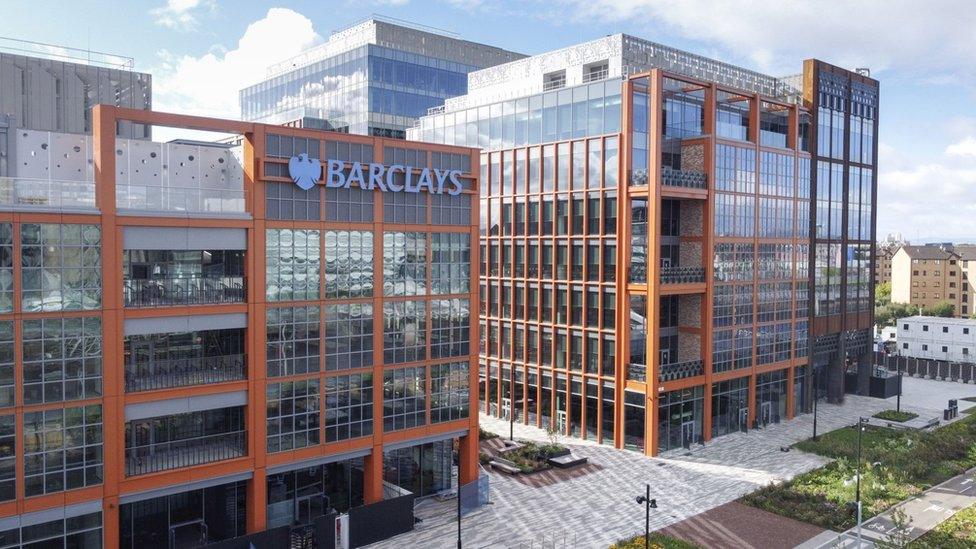Future of the Office: pivoting from work to people
- Published

Recruitment crisis? Boris Johnson says the answer is to pay workers more. That's unusual from a Tory MP, and risks fuelling inflation.
There are more imaginative alternative ways of responding to the staff shortages which have put recruits in the driving seat.
More pay may not be enough, after work through the pandemic has prompted many to reassess their priorities.
The demand for more flexibility is one, allowing more family time, looking after pets or health challenges such as the menopause.
There's also the challenge of adapting offices to make them places and spaces to which post-Covid returners would eagerly wish to return.
The workplace is a seller's market: 1.2 million job vacancies across the UK in September. That's a record, and it puts employers under pressure to respond.
Fending off demands for an easing up of rules that keep out foreign workers, Boris Johnson says that the employer response should be a pay rise.
He's got a point. Truck drivers and care workers probably should be paid more, just as gig workers have a strong case for a less precarious income.
But higher pay for truck drivers does not deliver higher productivity. It's much more likely to put up the price of delivering stuff.
And the Prime Minister is the one who will take flak for a cycle of price inflation as it takes hold, not only from wages, but also from transport fuel, other energy costs, the rising cost of hard-to-source goods, from construction materials to the chip-starved car market.
Costs for business and for employers are also going up with the rise in National Insurance Contributions, some of which will also feed through to prices.
Plus, government ministers can expect demands from public sector unions to keep up with Jones the Haulier, putting pressure on the Treasury's attempt to keep a lid on public spending.
One of the highly unionised parts of the private sector in Scotland, public transport, is currently using its leverage (ahead of the COP 26 summit) to push for higher pay. Wage inflation rewards those with most leverage and clout in pushing for higher wages.
It also skews employment towards those with the deepest pockets to pay. Amazon and big supermarkets can pay the upfront bonuses to poach drivers and shop staff from hard-pressed indies. This report, in The Observer, external, raises the question of whether Amazon is using its deep pockets to buy market share or if it's paying people what they deserve and setting an example for others.
Spark of creativity
However, pay is only one of the ways in which employers can respond. There are other motivations for going out to work, and increasingly, employers will have to be smart about what they provide.
Even with the £1,500 signing-on bonus reported for Amazon in its Dunfermline warehouse, there are also reports of very stressful work conditions, driven by data.
As for offices, working from home has been unwelcome for some. Young people wanting to get up the career ladder have lacked the opportunity to learn from others, and have had a tough job getting noticed. Those who work by collaboration are missing the spark of creativity from sharing the same space.
Some live in unhappy homes, or without enough space, and some are simply lonely in the absence of the stimulus of work and co-workers.
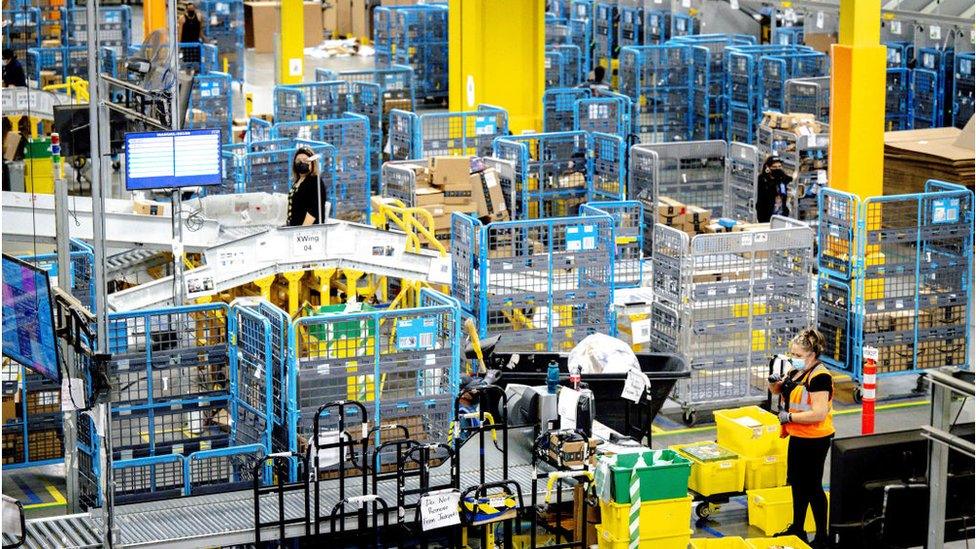
Amazon is reported to be paying a signing-on bonus
So when Scots office workers are allowed to return, such people won't take much persuading. For many others who have learned to enjoy the flexibility and absence of a commute, employers either have to get tough, or they have a job of persuasion on their hands.
The Great Resignation
I get media releases on numerous surveys on this subject, and they converge around the conclusion that many workers are willing to walk out of their jobs if they're forced to return to the office.
Some call it 'the Great Resignation', and talk up the potential for workers - having tasted the freedom of flexibility and home-working - to quit and strike out for a better work-life balance, rather than return to the commute and the rat race.
How, then, will offices and employment have to change in the post-Covid era? Some companies will downsize their office footprint, and stagger the times and days at which hybrid workers come in.
Others are setting days of the week when they expect workers to attend, but if they are all expected on the same days, that is not an opportunity to reduce the office floor space. They still have to plan for high peak attendance.
Many of them are busy re-allocating space within offices. Assuming that a lot of the lone screen time for writing, processing and analysing will be at home, visits to the office will be more about meeting, creativity, brainstorming and social time.
A challenge there will be the avoidance of too many meetings to justify that facetime in the office.
Returners are finding out that another challenge is making hybrid meetings work, where those in the room can be at a marked advantage over those who are not - advantages in getting a message across clearly and without barriers, in building support for an argument from others attending, in reading body language, and in schmoozing before and after.
Brainstorming shed
The most imaginative spaces being designed into offices are in the break-out spaces, for people to meet and talk in unstructured smaller groups. Some go for beanbags, some for bar-stools. One Glasgow firm, itison, features a fireman's pole to get from one storey into the kitchen (other forms of descent are also available).
That's where the bonds are formed and the ideas are sparked. And if there's anything people have missed about being at work, it is the company, the people and the chat.
BBC Scotland got ahead of this 14 years ago, when its new headquarters was ridiculed for having a garden shed to boost programme-makers creativity. The shed has gone (it was never intended for journalists, alas), but the creative spaces were ahead of their time and are becoming standard.
Tech companies came along in the past decade, with advanced coffee-making systems as well as the water cooler, plus table football and pool. If Gen Z are expected to do those extra hours, or choose to do so, the firm offers the pretence that they are almost in the bar or at home.
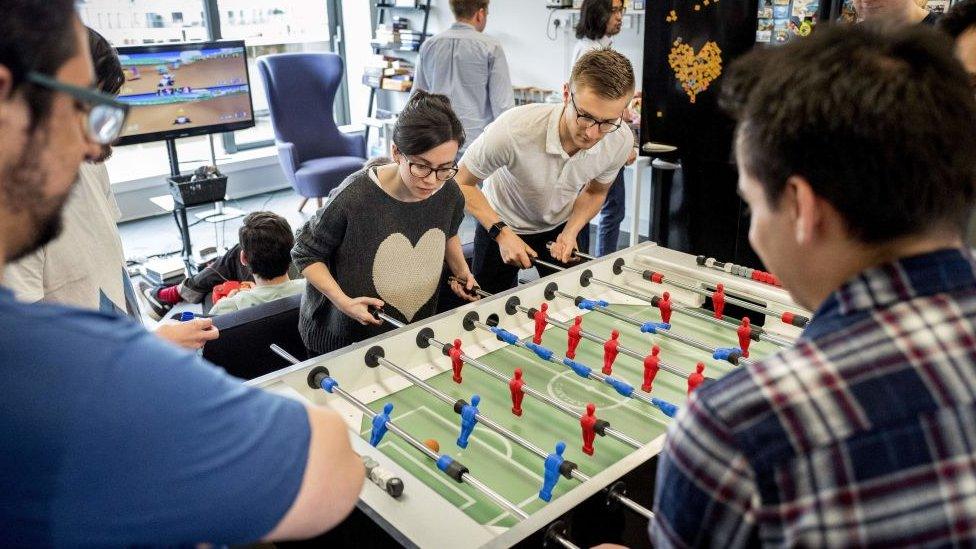
Gyms are a priority for some. They can be offered on the premises. A new office block on Glasgow's Bothwell Street offers a running track with a view, high up on its roof.
This is nothing new: I recall call centres offering their stressed-out staff a choice of a silent room or somewhere they could go and take out their frustrations on a punchball. Such office extras seem to be becoming more common, a priority for retaining, motivating and de-stressing staff, and a way of building company culture.
Dynamic workforce
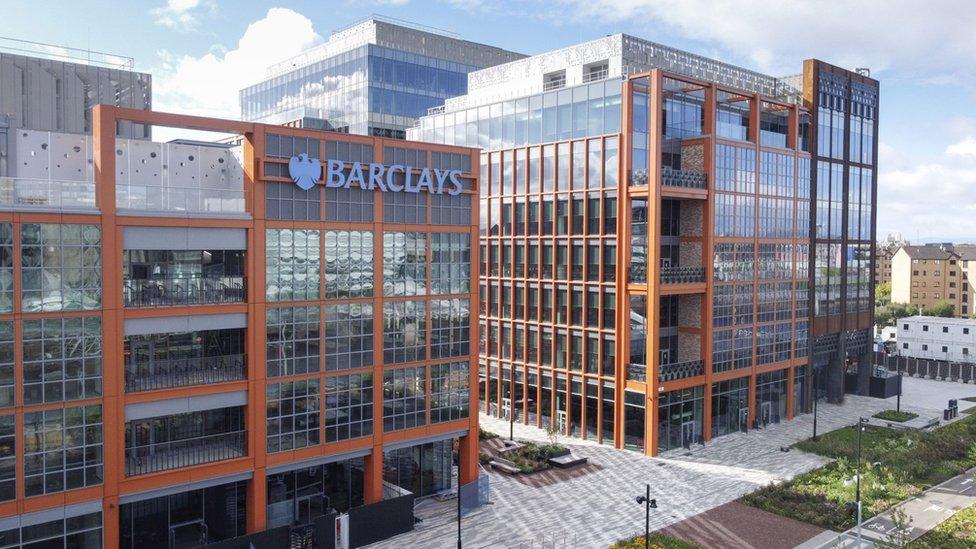
Barclays aims to bring together about 5,000 staff at its new campus within two years
Last Tuesday, at the official opening of the Barclays campus in Glasgow - designed for 5,000 staff, a doubling of the bank's Scottish workforce, many in technology roles as well as fraud detection - its chief executive, Jes Staley, told me none of the plan is different because of the pandemic experience and time away from office work.
He said: "If you walk around the complex here, and we have five buildings in this area, there's a lot of areas for shops, gatherings, and outdoor space. The idea was to build a certain type of community - one that will help us attract and retain the very best talent."
A fundamental of the design was for neuro-diversity - working with Autism Scotland to make this a comfortable place for all to work. Some companies are actively embracing the skills of those with autism, as opportunity more than disability.
"There are places where people can gather, very casually and in small groups, places you can be alone if you'd like to," Staley said. "It's a very dynamic workforce.
"It's so different from your traditional walk-in office. It's really based on people having a very flexible approach to how they work. The pandemic, if anything, underscored why this design is going to work so well."
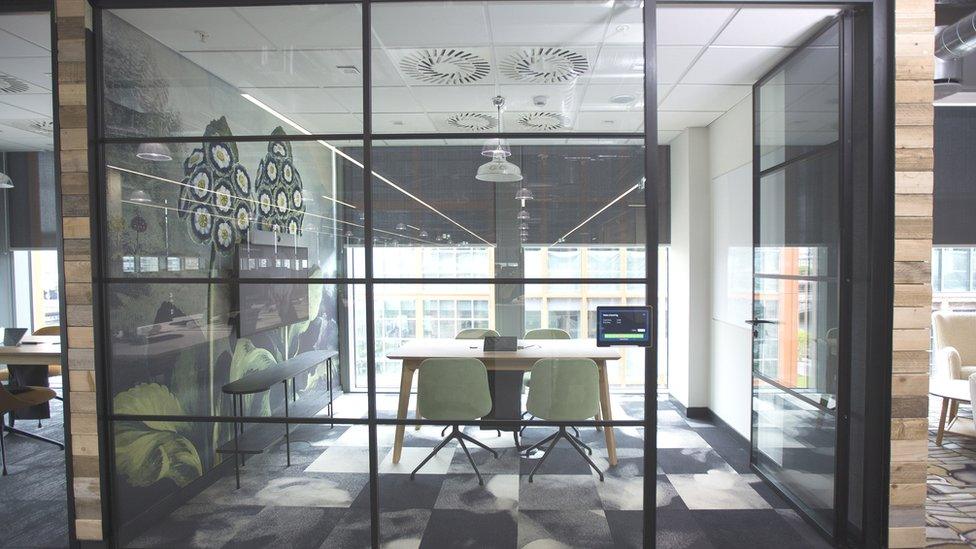
Among those unsolicited emails I've been receiving, leadership coach Ollie Phillips observes: "There is merit in allowing people to have the autonomy to work where they want and live the life they want to live, whilst also providing a structure and demonstrating the value of physically being in the workplace as well as creating a compelling, interactive environment where people still want to."
In other words, make the office environment something people freely choose because they enjoy it, and the company.
We also heard last week from Jordan McAffery of HK design consultancy in Edinburgh, where the workforce has pivoted almost entirely to office re-design.
He said: "Staff are craving variety in the workplace.
"Gone are the days of traditional workstations and rows upon rows of desking. During working from home staff have been used to sitting in a lounge area, working on the kitchen table and we're trying to introduce that to workspaces and create that sense of home from home
Poor managers?
Employers are reluctant to talk about getting people back into the office. Some are privately annoyed that it is still strongly discouraged as a matter of Scottish government guidance.
It's not possible to say if the pandemic and working-from-home have led to improved or worsened productivity.
Sketchy evidence suggests that some have seen productivity hit, and some have seen it improve. One sector will differ from another. Where firms differ, the poor productivity can sometimes be explained by poor management.
But while improving pay and/or the quality of experience when people do - eventually - return, there are other factors that can help employers get the workers they need in a tight labour market, where employees currently have the stronger hand.
Doggy daycare
Extra days off are among them, currently being used as a reward to those who have been through stressful times.
Staying closed on December 26 is being chosen by some, while some argue it should be required. A chain of west of Scotland bars is foregoing the bumper takings of New Year's Day to give their workers another day off.
Maybe because we've just ended National Work Life Week, my email inbox has not been short of advice.
One call is for employers to adapt work flexibly to the menopause. There came a response from CityUK, representing the finance sector, demonstrating precisely the shift in employer embrace of flexibility to retain staff.
It said: "Openly recognising and discussing the impact the menopause can have on women and their careers, and ensuring they have proper support, is the right thing to do both ethically and commercially. It is also essential to mitigating the potential fallout of talent in the workforce."
There are software solutions to improve 'workflow solutions' in the era of hybrid working.
An adviser on work-life balance from Cardiff got in touch to cite survey evidence that suggests only one in five employees would raise concerns about work-life balance with their bosses, but that one in six is ready to leave their job because of stress.
Set a good example, he suggests. Listen, through staff surveys. And create a space in time, of perhaps 15 minutes, to zone out of work at the end of the working day, whether at home or in the office.
Another email asks if bosses should take responsibility for pets. It's well known that dog ownership has become a more widely shared feature of home life during the pandemic.
While away at work, people miss their dogs: their dogs miss people. So anyone for the new differentiating factor in attracting workers: doggy daycare in the workplace, or your pooch by your side through your brainstorming encounter?
Related topics
- Published12 October 2021
